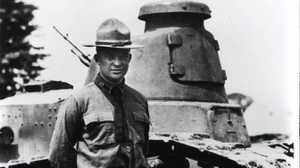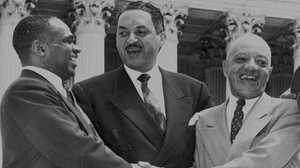Letters to Mamie
Excerpts from Eisenhower's letters home to his wife, Mamie, during World War II.

September 15, 1942
I'm so d--- mad today that I shouldn't write to you; but it occurred to me that the scribbling of a note might reduce the heat of anger and get me on an even keel again. It was only a relatively small incident that upset me — but every once in a while my bad disposition gets the best of my good nature.
So far as I can recall nothing of importance has happened except the opening of the box you, and I assume, Ruth, sent to us. I go on the theory that everything arriving here of that description is a joint affair -- that's the way Butch handled his enormous trunk load of things he brought over originally! Anyway the fruit juices are delicious; and we appreciate them. But do not send more until we send you word we're running low!
Some time ago you mentioned Aug. 24 as Ikky's Birthday. I think you must have been thinking of September! Anyway, according to my feeble memory he would have been 25 on the 24th of this month.
I'd rather they'd put in a solid 3 year course at WP than to cut it down progressively to what they did in the last war. At least J. will have a chance to mature before he has to take his place as a 2nd Lt.
Quite a lapse right here; 24 hours. We're working hard on a secret conference for evening. The problem is to have 11 men meet clandestinely that no one even knows they've met! Isn't that something? Think I'll wear a false mustache and dark glasses. Possibly a wig would be more effective!
I know that you must be rather bewildered at times. This war has played havoc with our accustomed modes of life, and even after we've won the military victory, the problems facing the world will be such as to require a courage equal to that of the battlefield. It is completely illusory to hope to go back to the "old days." Just as the World War brought in an era of almost hysterical change and restlessness, so will this one bring about revolutions in our customs, laws and economic processes. If we could hope for a greater mass discipline--self imposed there would be cause for rejoicing; the danger is that special economic, industrial or social groups will apply pressures that will either be disruptive or might force, for a time at least, the adoption of some form of dictatorship in our democracies. Either outcome would be tragic; and I do hope that people with brains are foreseeing the possibilities and preparing for them. The longer the war lasts, the greater will be the post-war problems, but on the present showing it looks as if we must face a long struggle.
I don't mean to get either philosophical or morbid. But we've got a job to do then an equally big job to tackle. As men and women of character and of faith in the soundness of democratic methods, we must work like dogs to justify that faith.
I envy the young — the ones just starting in on this most important epoch. I hope they can be successful in making it the "Golden Age of Democracy."
ALGIERS, June 11, 1943
A very strange coincidence occurred this morning. I had two letters from you (one a V mail written on May 24) and in one of them you mentioned my driver, and a story you'd heard about the former marital difficulties of her fiance. You said it was a "not pretty" story. Your letter gave me my first intimation that there was any story whatsoever -- I didn't know anything about it. In any event, whatever guilt attached to him has been paid in full. At the same moment that your letter arrived I received a report that he was killed — by a mine! I knew him quite well and I liked him — he was 32 and was a full colonel of engineers, commanding a regiment. In an active theater of war when death is an every day occurrence and one is constantly receiving notice of the death of valued subordinates — and sometimes close friends — I suppose that senses of values do change -- but not as to fundamentals. Decency — generosity — cooperation--assistance in trouble — devotion to duty; these are the things that are of greater value than surface appearances and customs. So what young Arnold did, I do not know. But here we considered him a valuable officer and a fine person. I'm saddened by his death. His name is added to a list that includes Andrews -- Dykes -- Duncan -- Stewart -- Vogel and others; all senior officers and good friends of mine that are no more. War is often sad.
Today we took the Island of Pantelleria, as the papers will have told you by this evening. I am particularly pleased because everything happened as I predicted it would. We don't know yet how many more prisoners we took. But I know you are happy over every piece of good news that comes from this theater.
Did you see the article on my mother in Good Homes & Gardens? Very nice, I thought!
Your letters often give me some hint of your loneliness, your bewilderment and your worries in carrying on your own part in this emergency. Don't ever think that I do not understand or that I am not truly sympathetic to the lost feeling you must so often have. Just please remember that no matter how short my notes I love you -- I could never be in love with anyone else -- and that you fill my thoughts and hopes for the future always. You never seen quite to comprehend how deeply I depend upon you and need you. So when you're lonely, try to remember that I'd rather be by your side than anywhere else in the world.
LONDON, February 14, 1944
I sent you a short Valentine message this AM. I do hope is reaches you — it is the only observance of the day I made... I never forget that 28 years ago I brought out the West Point Class Ring to 1216 McCullough, proud as a peacock!!
Every month through which I live seems to be more crowded than any pervious one. I've built up defenses to the increasing pressures and responsibilities, and try to think only of essentials -- trying to get basic things started right, with the right people in charge of each important activity. I'm trying to age on a coordinated plan -- I watch my disposition just as I do my diet. Exercise has been out for eight months. I must get started soon.
If you had the customary family party today I suppose there was a dinner party with red ribbon — etc. — with some singing and lots of Valentines; maybe flowers. In any event, I hope you had a good time.
What a day — I've had at least six visitors since starting on what I intended to be a real Valentine letter. Each interruption makes it just that much more difficult to say what I really want to tell you, which is that I'm lucky to have had you to see or to send a message to every Valentine Day for 28 times. Quite a record in itself — even if you were only an ordinary woman. But considering that everyone loves you -- most deservedly — I wonder how my luck has held so long. Take care of yourself, my sweet — maybe on next Valentine Day I can crack your ribs instead of hurting your eyes with a scrawl like this — I love you - always.
PORTSMOUTH, June 9, 1944
My darling:
I just sent you a teletype. As always when I go through these intense periods of strain and effort I think of you, want you here, and try to write to you — but I'm afraid that even my short notes are rather incoherent!
Anyway, we've started. Only time will tell how great our success will be. But all that can be done by human effort, intense devotion to duty, and courageous execution , all by thousands and thousands of individuals, will be done by this force. The soldiers, sailors, and airmen are indescribable in their elan, courage, determination and fortitude. They inspire me.
How I look forward to seeing Johnny. It will be odd to see him as an officer of the Army! I'll burst with pride!
REIMS, May 12, 1945
Darling:
For a month I've been trying to figure out the earliest date on which I might get home, even briefly, to see you and my mother. While I know (or at least I think I do) that I can make it within a reasonable time — it is still as difficult as ever to make any definite plan.
One of the troubles all senior officers will encounter (I probably most of all) will be the necessity of going through certain formal receptions. Possibly, in my case, I may have to face two, three, or even more. As a matter of courtesy these must be carried out — troops here would feel their senior commanders were not received with some acclaim on their first trip home. (All this is very secret.)
The need for arranging these things takes some time. Moreover, the receptions themselves will cut into the private time I will be wanting with you.
But one thing I hope for is to work out some "policy" by which families can come over here; the difficulty will be so to formulate it that the lowest private has the same right as the highest general. This I must insist upon! One of the greatest drawbacks will be lack of suitable quarters in Germany. The country is devastated. Whole cities are obliterated; and the German population, to say nothing of millions of former slave labors, is largely homeless. There is certain to be unrest, privation and undoubtedly some starvation next winter. It is a bleak picture. Why the Germans ever let the thing go as far as they did is completely beyond me!
There are now so many men thronging the outer office that two secretaries are having a hard time entertaining them. Gosh! these are busy times! In thirty minutes I must run out to see some returned prisoners of war. We're evacuating them as rapidly as possible — but there are so many!
Well Sweet — here's to an early meeting, but just when, I can't say. P.S. I have to go to London Tuesday. Some good friends of John's and mine have asked us to a theater and supper party. So for the first time in this war I hope to go out — unless John doesn't want to do so. It would be fun, I think. Haven't seen a show and eaten in a restaurant in three years.







